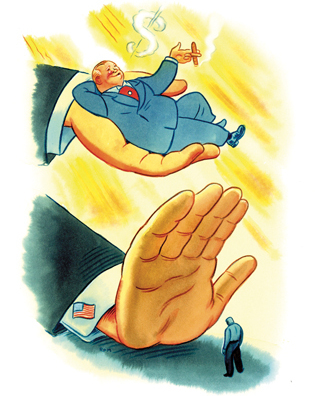 loading
loading
ForumInequality by design
Jacob S. Hacker '00PhD is the Stanley Resor Professor of Political Science at Yale. Paul Pierson '89PhD is the John Gross Professor of Political Science at the University of California–Berkeley. They are the authors of Winner-Take-All Politics: How Washington Made the Rich Richer—and Turned Its Back on the Middle Class.  Ross MacDonaldView full image
Four years ago, treasury secretary Henry Paulson took a moment from economic cheerleading to acknowledge that, yes, inequality had risen. Over the previous three decades, the share of pretax national income raked in by the richest 0.1 percent of Americans (the top 1 in 1,000) had more than quadrupled. By the time Paulson spoke, this tiny upper crust (average 2007 income: $7 million) brought home about one of every eight dollars earned in the United States. Paulson expressed concern, but his basic message was get used to it. Growing inequality, he said, "is simply an economic reality, and it is neither fair nor useful to blame any political party." Today, the gap between continuing hardship on Main Street and booming profits on Wall Street is even more undeniable. Yet Paulson's viewpoint appears as widespread among the prosperous and powerful as ever. We hear again and again that those at the top are simply "superstars," empowered by technological change and globalization to make vast fortunes. Public policy, in this common perspective, has little or nothing to do with it. But this common perspective is wrong. Washington has been no innocent bystander in our steady march towards a dramatically more unequal society. A massive increase in campaign costs and lobbying activity has made politicians in both parties increasingly attentive to those at the top of the economic ladder. The response has been a string of political decisions that have greatly abetted the shift of rewards to the top reaches of the economic ladders. Henry Paulson, in fact, provides a big clue about what happened. He, like so many recent prominent economic officials, straddled the worlds of Wall Street and Washington. Under Republicans and Democrats alike, Wall Street received an increasingly sympathetic ear, even though its activities were enriching just a tiny slice of Americans and posed real risks to the economy as a whole. Titans of finance surely like to think they earn their wealth. Back when he was chairman of the rich and powerful Citigroup, rather than ex-chair of the hugely indebted Citigroup, Sandy Weill told the New York Times, "People can look at the last 25 years and say this is an incredibly unique period of time. We didn't rely on somebody else to build what we built." No, Weill didn't rely on "somebody else." He took matters into his own hands and led the lobbying charge to repeal the Glass-Steagall Act. With enthusiastic support from President Clinton, Congress rolled back the centerpiece of New Deal banking regulations—regulations that, for over half a century, restricted banking risk and made the nation's repeated financial crashes merely an unpleasant memory. On his office wall, Weill put up a four-foot-plus–wide plaque with his image on it and the words "Shatterer of Glass-Steagall." He apparently didn't believe that policy was irrelevant. Supporting the high fliers of finance was only one part of what American politicians did to build a winner-take-all economy. They also repeatedly delivered tax cuts that were exquisitely targeted toward the most well-to-do—economic smart-bombs that showered cash on a select few. The effective tax rates of the richest taxpayers, the amount they actually pay, plummeted from the late 1970s through the early 2000s. For the top 400 taxpayers, the individual income tax rate they paid on average fell from over 40 percent in the 1960s to around 30 percent in 1990 to less than 17 percent in 2007. Thanks to concerted efforts of the GOP and weak knees of some Democrats in 2010, these ultralow tax rates have been retained, despite rising deficit fears. At other times, Washington has been a silent partner, sitting on its hands while economic changes rendered existing rules obsolete. While bankers outflanked restrictions and corporations pushed out unions, powerful organizations urged Washington to do nothing; and Washington complied. Many analysts would have us view the dramatic increase in inequality as akin to the weather—a natural condition that we should accept without complaint. We should be skeptical of this view—and not just because it's obsolete even with respect to the weather, which we now know to be subject, for better or worse, to human intervention. We should be skeptical because government policies do not just reallocate income after the fact. Through regulation of finance and corporate governance and industrial relations, they also shape how markets distribute their rewards. We should also be skeptical because globalization and technological change, while surely creating pressures for inequality, do not dictate ultimate economic outcomes. Other prosperous economies have seen limited growth in inequality. Moreover, where such tendencies have emerged, their political systems have pushed back. It is the U.S. that stands out as an exception, as it gradually moves closer to the distributional structure characteristic of economic oligarchies like Russia, Mexico, or Brazil. The relevance of Washington to growing inequality is bad news for now. Newly empowered Republicans continue to push an agenda of deregulation, social spending cuts, and high-income tax cuts that will promote rather than challenge this trend. In the long run, however, the relevance of Washington is good news for those who view the trends of the past generation with concern. What happens in our politics matters a lot for how our economy operates, and for how its rewards and burdens are divided. Washington helped build an economy that showers so much on so few. It could help build an economy of broadly shared prosperity as well.
The comment period has expired.
|
|